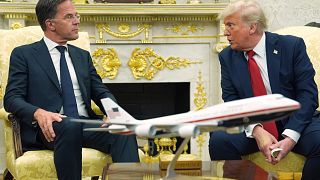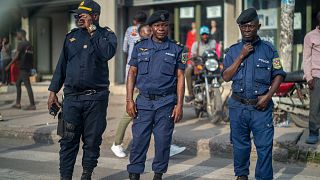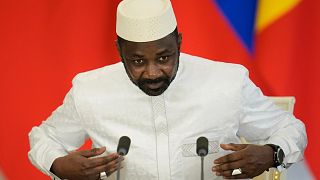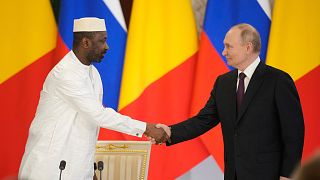Mali
In Mali Friday a new government has been formed.
It sees the military -- which staged two coup d’états in nine months, in charge of the West African nation's key ministries.
At its head -- albeit facing criticism of his position’s legitimacy, transitional president Colonel Assimi Goïta, who was sworn in on Monday.
Ministerial positions of defence, security, interior and national reconciliation are all occupied by military personalities -- some of whom held these titles at the time they were also leaders of the August 18 2020 coup that removed then-President Ibrahim Boubacar Keita.
Namely, Colonel Major Ismaël Wagué who remains the Minister of National Reconciliation and Colonel Sadio Camara -- who is back as Defence Minister after being ousted in late May by the since recently-removed former interim president Bah N'daw.
A move considered by some observers to have been a major move that triggered Goita to carry out a second putsch.
Former deputy chief of staff of the Malian army, Colonel Major Daoud Aly Mohammedine, and Lieutenant Colonel Abdoulaye Maïga take over the heads of Security and Territorial Administration, respectively.
Colonel Major Daoud Aly Mohammedine, and Lieutenant Colonel Abdoulaye Maïga take over the heads of Security and Territorial Administration, respectively.
As many in the international community -- such as ECOWAS and the African Union, express their disapproval at this most recent coup and the consequential new government in various ways, Colonel Assimi Goïta has promised at his investiture that the return to civilian power would take place at the beginning of 2022.
Goita also committed himself to respect a peace agreement that is crucial for stability in the Sahel.
On Thursday, it is a whole part of the Sahel that President Emmanuel Macron faced its responsibilities by announcing the end of the French anti-jihadist operation Barkhane, present in Mali, Burkina Faso, Niger and Chad, in favour of an international coalition whose contours remain to be specified.
But he first targeted Colonel Goïta, who was sworn in as Mali's transitional president on Monday, calling him a "putschist" and reproaching West Africa for having "recognised" him as transitional president, "six months after having refused him this right".
The Malian military has not spoken publicly since, but the announcement of this government could be "a signal that they have the power and intend to exercise it well", according to an African diplomat in Bamako.
- Not taking responsibility" -
After his appointment, Prime Minister Choguel Kokalla Maïga, from the Movement of 5-June / Rally of Patriotic Forces (M5-RFP, a collective of opponents of religious and civil society), had promised a government "inclusive" and "openness".
A notable appointment of openness among the 28 ministers: another prominent member of the M5-RFP, Ibrahima Ikassa Maiga, also a member of the party of the deceased former opponent Soumaïla Cissé, becomes Minister of State Refoundation.
The announcement comes a day after Emmanuel Macron made strong announcements on the future of the French presence in the Sahel after eight years of military presence without any improvement in the situation on the ground. The jihadist groups being fought have, on the contrary, grown in size over the years.
Mr Macron blamed the Sahelian states, Mali in particular, for the fact that large areas of the country are still deprived of basic services "because the states have decided not to take their responsibilities".
"Relations between Bamako and Paris are clearly strained and (the French announcements) will not make things any easier," said Ornella Moderan, head of the Sahel programme at the Institute for Security Studies (ISS), stressing however that the announced reconfiguration is "not a withdrawal" and that "dialogue has not broken down" between Paris and Bamako.
- The ball in the Sahel's court" -
For security consultant Mohamed Coulibaly, the latest upheaval in Mali is a "pretext" seized by Paris to announce an "honourable way out" in the face of "the fear of stalemate".
On Friday, Paris announced that it had killed a major jihadist leader in early June, who was "responsible" for the 2013 kidnapping of two French RFI journalists, Ghislaine Dupont and Claude Verlon, who were killed in northern Mali after being taken hostage.
He was part of the jihadist movement Al-Qaeda in the Islamic Maghreb (Aqmi).
French Defence Minister Florence Parly assured that "the (French) military commitment will remain very significant", while Paris is currently deploying some 5,100 soldiers in the Sahel against the jihadists.
After eight years of uninterrupted presence of the French army, which had stopped in January 2013 an armed column of jihadists threatening to seize Bamako, the former Malian Prime Minister Moussa Mara said on social networks that the "ball is now in the camp of the Sahelian countries and their respective armed forces".
"Our authorities must tell us how they intend to meet the challenges of the fight against terrorism, the effective presence of our administrations in the territories and the lasting security of our populations. Firstly, each of us at home, then collectively in the face of transnational threats.













01:54
"Great economic potential in Africa": five African leaders have lunch with Trump
01:49
Broken windows and lootings: Nairobi businesses deal with protest aftermath
01:01
Chad’s former Prime Minister appeals to Macron after two months in detention
00:44
Mali junta chief extends army rule by five years, rules out elections
01:09
Guinea presents draft for new constitution, referendum set for September
01:00
Detained Chadian opposition leader Succes Masra ends hunger strike